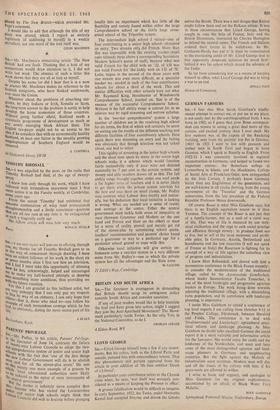LLOYD GEORGE Sig,—Lloyd George himself bore a few if any
resent- ments. But his critics, both in the Liberal Party and outside, pursued him with extraordinary venom. That this phenomenon still persists appeared from the article in your addition of 7th Else entitled 'Death of a Liberal'.
In particular your contributor refers to the Chanak crisis when, he says, 'war itself was seriously con- sidered as a means of keeping the Premier in office'.
A grosser falsification would be difficult to imagine. In early September, 1922, the Turks, under Mustapha Kemal had occupied Smyrna and driven the Greeks
across the Straits. There was a real danger that Kemal might follow them and set the Balkans ablaze. It was in these circumstances that Lloyd George, having sought in vain the help of France, Italy and the British Dominions, instructed Sir Charles Harington to defend the neutral zones. The French and Italians ordered their forces to be withdrawn. As Mr. Gathorne-Hardy has put it 'it must be remembered to the everlasting credit of Mr. Lloyd George that in this apparently desperate isolation he stood firm'. Indeed it was his action which stayed the advance of the Turks.
So tar from considering war as a means of keeping himself in office, what Lloyd George did was to bring a war to an end.
House of Commons,
DINGLE FOOT


































 Previous page
Previous page